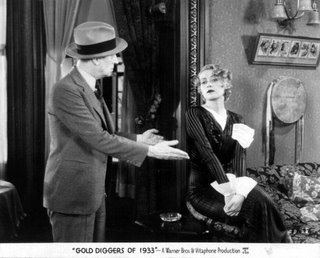
Gold Diggers of 1933
I've been looking for a digital version of Gold Diggers of 1933 for years, and now it's out, part of what looks to be a very fun set. The Busby Berkeley Collection includes five picture shows featuring Berkeley dance numbers: Gold Diggers of 1933 and Gold Diggers of 1935, Footlight Parade, Dames, and 42nd Street.
Dear Readers, these are the bee's knees, nifty fifty, each and all pitchin' some serious woo. I'm not much of a fan of musicals, but there's something so bizarre and interesting about Busby Berkeley's set pieces and choreography that I find myself mersmerized. In the case of Gold Diggers of 1933, I especially love the cast of characters running around in front of the quite serious backdrop of the Great Depression. The conflicts in this movie involve romance and the rich-poor divide, appearance versus reality. The women in the film seem especially modern in their Marxian approach to survival during very hard times. My favorite scenes are not the dance numbers, but the interactions among the "gold diggers." Clearly, the Hollywood censorship and family code machine had not kicked into high gear yet, which may come us a surprise to some viewers who think of such classic movies as merely G rated Disney fare. For example, one of the most bizarre sequences in the film is the long dance number, "Petting in the Park," and it's not referring to walking dogs.
Ginger Rogers opens the show with "We're in the Money," and everything goes haywire from there as producers try to raise capital for new productions. Brad (Dick Powell) tries to help out and falls for Polly (Ruby Keeler), but his wealthy and suspicious brother J. Lawrence Bradford (Warren William), with daft lawyer Fanuel H. Peabody (Guy Kibbee) in tow, try to stop the fun -- and are waylaid and seduced by the crafty and resilient Carol (Joan Blondell) and wise-cracking Trixie (Aline MacMahon). Much intrigue and fun ensues as everyone muddles through to the final show.
The film was directed by Mervyn LeRoy, who went on to do The Bad Seed more than twenty years later. The grand finale showcases "Remember My Forgotten Man," a tribute to World War One veterans and all who had to endure the Great Depression. It's wild in that Busby Berkeley way -- if "We're In the Money" gleamed with art deco flourishes, this number has a touch of bleak German Expressionism and a true grasp of hard times. Brother, can you spare a dime?
There are lots of fun exchanges, too. One of my favorites is between Carol and J. Lawrence, who quips to her, "Every time you say 'Cheap and Vulgar' I'm going to kiss you."
Carol: "Cheap and Vulgar!" They kiss.
"Cheap and Vulgar!" They kiss again.
"Cheap and Vulgar!" One more time for the back row . . . . .
Ciao!








3 comments:
This sounds great -- so glad it's been released!
Sexy post -- can I have your number?
Not necessary to say to it that this age the type of film that attended when child very, when they still passed for here in the "Session of the Afternoon". I feel homesickness and that luck its power to rescue everything this and to see again. Lately they think only about ticket offices. Kisses
Post a Comment